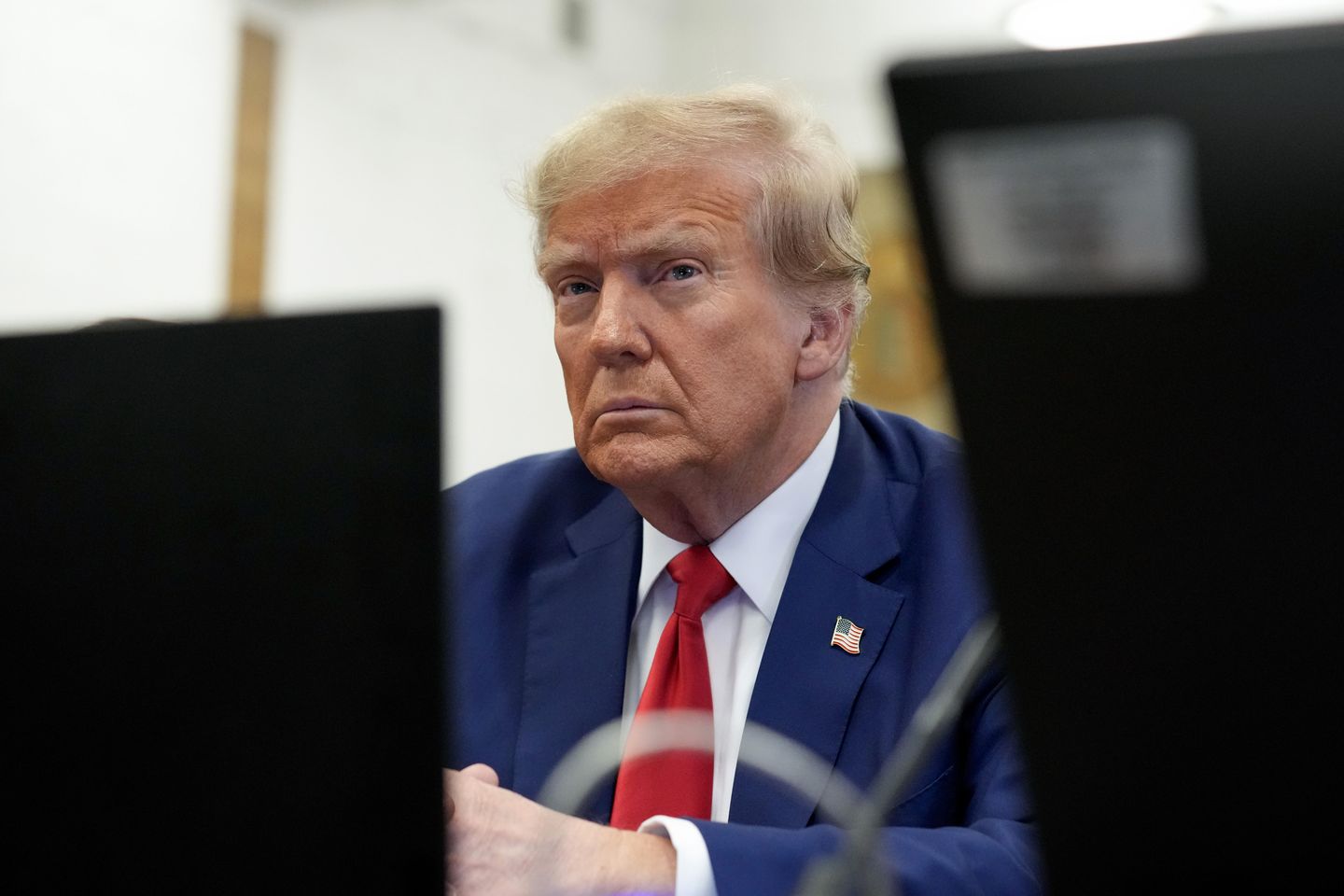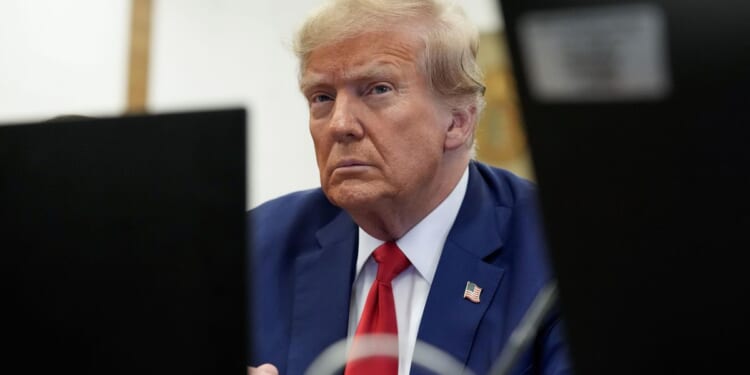
It usually takes defendants charged with federal crimes more than two years for their cases to work their way through the courts, another indication that the push to put former President Trump on trial more rapidly this year is motivated by the election calendar.
Data from the United States Courts in 2023 reveal that it took a median of 26 months from the time charges were brought against a felony defendant in Washington until the jury trial.
In Mr. Trump‘s two federal cases, brought in June and August 2023, prosecutors’ goal of holding trials before November would cut that average timeline roughly in half.
Mr. Trump was indicted for mishandling sensitive government documents after he left office, and for orchestrating election fraud in an attempt to overturn the 2020 presidential contest. The data from the cases suggest he wouldn’t see his trials take place until next year, months after the Nov. 5 election.
The former president is the presumptive GOP nominee headed for a rematch with President Biden. Mr. Trump has frequently accused Democrats and the Biden Justice Department of prosecuting him to weaken his candidacy.
“There is only one thing on the calendar causing them to rush, and that’s the election,” said Curt Levey, president of the conservative nonprofit group Committee for Justice. “It’s clear that Biden wants it before the election, and [Attorney General Merrick] Garland got the message and that’s one of the reasons he got this aggressive prosecutor [special counsel Jack Smith]. There is no question that Smith is rushing it because of the election. Clearly the goal here is to interfere in the election.”
Elliot Mincberg, senior fellow at the progressive advocacy group People For the American Way, said there’s a legitimate reason for the prosecution to seek a speedier trial in the election interference case against Mr. Trump.
“Having him face trial prior to the election will allow people to learn more about the facts and whether a jury agrees if he’s committed misconduct before the election,” Mr. Mincberg said. “I think the American people have an interest in seeing that happen.”
Mr. Trump‘s legal team is seeking delays in both federal cases, as is routine.
“Trump is looking to delay — rightfully so from his perspective. No reason for Trump to do anything now except for continuing to try to push out the trial date,” said Adam Feldman, Supreme Court scholar and creator of the Empirical SCOTUS blog. “Most defendants plea out, but most have different incentive structures from Trump‘s.”
Mr. Feldman also said it is unusual not to have any trial date set for lawyers to work off of, as they prepare for discovery and various motion deadlines.
Mr. Trump‘s trial in the D.C. case was originally set for March 4 — but that’s been pushed back due to the Supreme Court hearing his claims of absolute immunity from criminal prosecution. And his Florida prosecution in the documents case doesn’t have a trial date set, after it was pushed back from May.
“The fact that there’s no placeholder seems a little odd and I think that is what makes some folks in the public skeptical about the process in this case and the role of politics,” Mr. Feldman said. “If it was anyone other than Trump, no one would bat an eyelash if there was no trial date yet. But then again, no one would likely be looking for one except for the parties in the case. Definitely nothing odd about this one not going to trial yet.”
Under the Speedy Trial Act, a federal trial is expected to be set within 70 days of a defendant being indicted, but that never happens, said Thomas Hogan, a professor at South Texas College of Law.
He said the legislation’s requirements are affected by various circumstances, such as motions or witnesses being unavailable.
“There is nothing unusual about a federal criminal trial taking place a couple of years after the indictment,” Mr. Hogan said. “Every good defense lawyer in almost every case is seeking to continue and delay the case. Simply put, things go wrong for the prosecution in the interim, often unpredictably. The prosecution seeking to get to trial quickly and the defense seeking to delay proceedings is the battle that happens in American courtrooms every day.”
But Theodore M. Cooperstein, an appellate lawyer who represents Jan. 6 defendants, said he has rarely seen a prosecutor as aggressive to rush to trial as Special Counsel Jack Smith, who is bringing both the Florida classified documents case and the D.C. elections case against the former president.
“It’s all part of having due process,” Mr. Cooperstein said. “The people who are just too impatient and want to hang him now and have a trial later, I’m sorry, it just doesn’t work that way.”
In court filings, Mr. Smith has argued there is “public interest in a speedy and fair trial.” He says Mr. Trump must be stopped from engaging a second time in an abuse of power.
“The public interest in a prompt resolution of this case favors an immediate, definitive decision by this court,” he wrote in a brief last year. “The charges here are of the utmost gravity. This case involves — for the first time in our nation’s history — criminal charges against a former president based on his actions while in office. And not just any actions: alleged acts to perpetuate himself in power by frustrating the constitutionally prescribed process for certifying the lawful winner of an election. The nation has a compelling interest in a decision.”
Since then, the appeals court did weigh the issue and ruled unanimously against Mr. Trump‘s claim of absolute immunity against prosecution. The issue is set to be argued before the Supreme Court on April 25. Mr. Smith had wanted the high court to let the appeals ruling stand so the case could head to trial sooner.
A ruling is not expected from the Supreme Court until the end of June. All proceedings at the D.C. trial court have been put on hold until the justices weigh in.
Similarly, in the Florida case, the judge has not set a new trial date after the original May 20 date is expected to be pushed back. Mr. Smith‘s team suggested the trial could take place in July, but the judge seemed skeptical that would be enough time for various pretrial motions.
Jeffrey Swartz, a professor at Cooley Law School and a former county court Judge in Miami-Dade County, said he believes the federal district court judge in the Florida case, Trump appointee Aileen Cannon, has delayed the proceedings intentionally.
“She has done everything in my opinion to handicap the prosecution in this case. That’s why the delay,” Mr. Swartz said. “This case would have been to trial already.”
In the Southern District of Florida, where the document case is pending, the median time between indictment to termination of a jury trial is 17 months. In D.C., it is 26 months.
Meanwhile, the fair election advocacy group Common Cause filed a brief supporting Mr. Smith at the Supreme Court in the D.C. case over Mr. Trump‘s claim of absolute immunity, saying the justices must decide the issue swiftly so the trial can take place before the November election and, ironically, so politics don’t appear to be at play.
“The American people deserve a trial and a verdict on these serious charges before they go to the polls in November,” said Virginia Kase Solomón, president of Common Cause. “The presumptive Republican presidential nominee stands criminally charged with conspiracy and obstruction stemming from his attempts to overturn the results of the 2020 election. It is critically important that the Supreme Court rule quickly, as it has in past presidential cases, so that justice can be rendered before Americans cast their ballots.”
In the D.C. dispute, Mr. Trump is charged with four counts related to his challenging of the 2020 election results, including one count of conspiracy to defraud the U.S., one count of conspiracy to violate civil rights and two counts of attempting to obstruct the vote certification proceedings.
In the Florida case, he faces charges under the Espionage Act for allegedly mishandling 32 documents, along with charges for obstructing justice and false statements.












